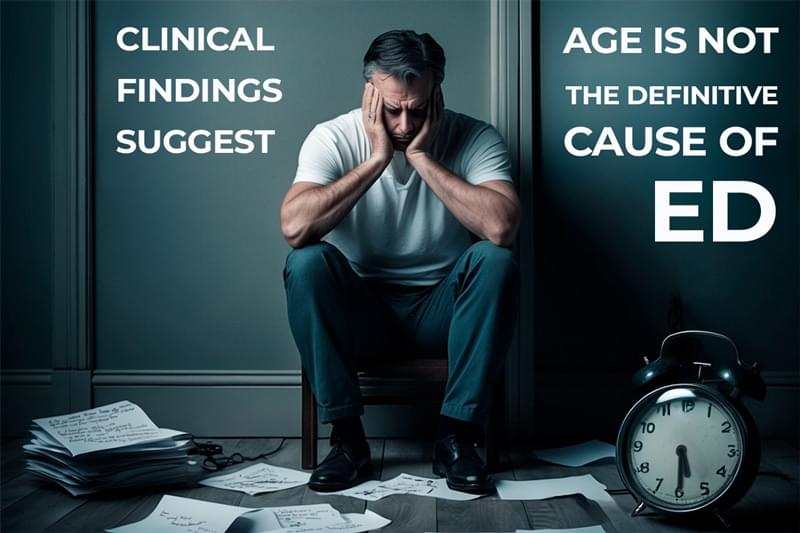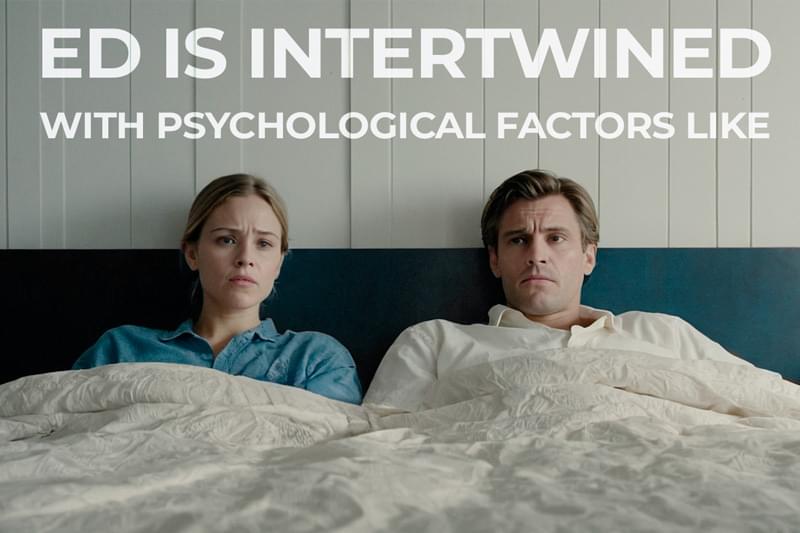Supporting Your Partner: Emotional Aspects of Erectile Dysfunction
Understanding Erectile Dysfunction: Beyond the Physical Realm
Erectile Dysfunction (ED) is often perceived solely as a physical ailment, shadowing its profound emotional and psychological implications. The condition, characterized by the inability to achieve or maintain an erection sufficient for satisfactory sexual performance, can be a symptom of underlying health issues, such as cardiovascular disease or diabetes. However, the emotional toll it takes on individuals is equally significant. The stress and anxiety stemming from ED can create a vicious cycle, where the fear of sexual failure exacerbates the condition, further entrenching feelings of inadequacy and embarrassment. This psychological component is crucial, as it not only affects the individual's mental health but also impacts interpersonal relationships, leading to a sense of isolation or withdrawal from intimate connections.
The acknowledgment of these emotional aspects necessitates an integrated approach to management, focusing on both the mind and the body. It is imperative to understand that ED can be a harbinger of deep-seated psychological stressors or relational conflicts. Research has shown that psychological factors, including stress, anxiety, and depression, can significantly contribute to the onset or worsening of ED. These findings underscore the necessity of considering mental health evaluations and therapeutic interventions as part of the comprehensive care for affected individuals. By addressing both the psychological and physical components, individuals can embark on a more holistic healing journey.
| Aspect | Impact |
|---|---|
| Stress and Anxiety | Can increase the severity of ED symptoms |
| Depression | Often comorbid with ED, exacerbating both conditions |
| Relationship Strain | Can lead to further emotional distress and withdrawal |
| Self-Esteem | Decreases as a result of recurring ED episodes |
| Comprehensive Care | Requires attention to psychological and physical health |
In essence, unravelling the complex interplay between the emotional and physical spheres of erectile dysfunction paves the way for more empathetic, effective, and holistic care approaches. By transcending the traditional boundaries that compartmentalize ED into merely a physical health issue, we can foster environments conducive to open discussions, comprehensive understanding, and more nuanced care strategies that acknowledge the full humanity of those affected.
Communication Is Key: Starting the Conversation Gently
Initiating a dialogue about erectile dysfunction (ED) with a partner requires a delicate balance of sensitivity and openness. At the core of this conversation is the understanding that ED is not merely a physical issue but deeply intertwined with emotional and psychological well-being. The manner in which this topic is broached can significantly impact an individual’s mental state and their willingness to engage in finding resolutions. Scientific studies underscore the significance of effective communication in managing the emotional ramifications of ED. They highlight that empathetic listening and the avoidance of blame can foster an environment where psychological barriers to sexual intimacy are openly addressed. Moreover, educating oneself and one’s partner about the multifaceted nature of ED can demystify misconceptions, facilitating a more supportive and less judgmental space for dialogue.
The role of emotional support from partners in navigating the complexities of ED cannot be overstated. Psychological research suggests that the emotional bond shared between partners acts as a crucial buffer against the stress and anxiety associated with ED. When partners engage in supportive dialogue, it not only alleviates the emotional burden on the individual experiencing ED but also strengthens the relationship by building trust and mutual understanding. This collaborative approach encourages a shared responsibility in overcoming the challenges posed by ED, highlighting how partner support plays a crucial role in the treatment and success of overcoming erectile dysfunction.
Furthermore, approaching the conversation with a focus on solutions and mutual support rather than attributing fault can lead to a constructive pathway towards recovery. Engaging in an informed discussion about potential treatments, lifestyle adjustments, and professional interventions can empower couples to take actionable steps together. This collective journey not only aids in the management of ED but also enhances relationship satisfaction by reinforcing the partnership’s resilience in the face of adversity. Thus, the essence of communication lies not just in the exchange of information, but in the compassionate connection it fosters, paving the way for healing and rejuvenation within the relationship.
The Power of Empathy: Walking in Their Shoes
Empathy, the ability to understand and share the feelings of another, sits at the heart of a supportive relationship, especially when one partner is facing erectile dysfunction (ED). Scientific research highlights the profound impact that emotional and psychological support can have on individuals with ED. By genuinely trying to understand the complexities of their partner's experience, an individual can foster a supportive environment that encourages open communication and emotional intimacy. This empathetic approach not only helps in alleviating the stress associated with ED but also significantly contributes to the efficacy of its treatment. Studies have pointed out that stress and anxiety can exacerbate ED symptoms, suggesting that a supportive and empathetic partnership can mitigate some of the psychological barriers to overcoming this condition.
The role of empathy in navigating the emotional terrain of erectile dysfunction cannot be overstated. Empathy involves more than just listening; it requires putting oneself in their partner's shoes and understanding the world from their perspective. This emotional attunement allows both partners to explore the vulnerabilities and fears surrounding ED without judgment, thereby creating a safe space for honest discussions. It is here, in this cultivated environment of mutual respect and understanding, that strategies for managing and overcoming ED can be most effectively developed. Furthermore, emotional support has been empirically linked to better health outcomes, underscoring how partner support plays a crucial role in the treatment and success of overcoming erectile dysfunction.
In this journey, celebrating every step forward, no matter how small, becomes a shared victory. This practice not only reinforces the value of empathy but also solidifies the bond between partners, making them stronger as a unit. Achievements in overcoming challenges associated with ED should be acknowledged, as they embody the resilience and commitment of both partners to work through difficulties together. Reflecting on these successes enhances the couple's confidence in their ability to face future challenges, laying a solid foundation for a healthy and empathetic relationship. Through the lens of empathy, partners can navigate the complexities of erectile dysfunction, transforming obstacles into opportunities for growth and deeper connection.
Navigating Challenges Together: Strengthening Your Bond
When faced with the multifaceted challenges presented by erectile dysfunction, a partner's support can be the linchpin in not only navigating these hurdles but also in significantly strengthening the emotional bond between partners. Research underscores the importance of mutual understanding and support in the management and treatment of erectile dysfunction, highlighting how empathetic support can lead to better outcomes. The journey through erectile dysfunction is often paved with frustration and vulnerability; however, through this adversity, couples have the unique opportunity to deepen their connection. By facing the issue together, partners can learn to communicate more effectively, fostering a deeper understanding of each other's needs, fears, and desires. This collaborative approach not only aids in overcoming the immediate challenges but also solidifies the relationship's foundation, making it more resilient against future adversities.
Furthermore, the role of partnership in the psychological dimensions of erectile dysfunction treatment is increasingly recognized in clinical practice. Studies have shown that when individuals with erectile dysfunction perceive their partner's support as positive and encouraging, they are more likely to pursue and adhere to effective treatment strategies. This collaborative involvement can range from discussing treatment options to attending doctor's appointments together, effectively demystifying the condition and reducing associated stigma. The act of navigating these treatment pathways as a team not only alleviates some of the emotional burdens but also promotes a sense of shared responsibility and success in the journey towards recovery.
Celebrating each step forward, no matter how incremental it may seem, becomes pivotal in reinforcing the partnership’s resilience and commitment to each other. Acknowledging progress, whether it be in the form of improved communication, increased understanding, or positive treatment outcomes, serves as a powerful reminder of the couple’s capacity to tackle challenges head-on. This culture of celebration and mutual encouragement helps cement the belief that together, they are stronger and more capable of overcoming obstacles, including those related to erectile dysfunction. In essence, the collective navigation through the intricacies of erectile dysfunction not only bridges gaps created by emotional distress but also nurtures a more profound, empathetic, and enduring partnership.
Exploring Solutions as a Team: a Journey of Healing
Embarking on a journey of healing together signifies the initiation of exploring multifaceted solutions that address both the emotional and physical dimensions of erectile dysfunction (ED). The involvement and support of a partner during this period can significantly enhance the efficacy of treatment approaches, thereby playing a pivotal role in the successful management and resolution of this condition. Scientific research underscores the importance of a holistic approach toward ED treatment, involving a combination of medical interventions, lifestyle changes, psychological support, and, crucially, open communication and shared experiences within the relationship.
As couples unite in their quest to overcome the challenges posed by ED, they often discover a range of therapeutic options, from pharmacotherapy and vacuum erection devices to surgical interventions and counseling. This collaborative exploration not only broadens their understanding of the condition but also empowers them to make informed decisions regarding their treatment plan. Engaging in this process together fosters a deeper connection, mutual respect, and a strengthened bond, highlighting the indispensable support a partner provides throughout the healing journey.
| Treatment Option | Description | Role of Partner Support |
|---|---|---|
| Pharmacotherapy | Use of medication to improve erectile function. | Encouraging adherence to treatment, discussing side effects. |
| Lifestyle Changes | Improvements in diet, exercise, and stress management. | Jointly participating in healthy activities, offering emotional support. |
| Psychological Counseling | Addressing underlying psychological contributors to ED. | Attending sessions together, discussing learnings and feelings. |
| Medical Devices | Devices like vacuum erection devices that help achieve erection. | Providing assistance in device operation, maintaining an open dialogue about preferences. |
Celebrating each step forward cultivates a positive environment where progress, regardless of its magnitude, is acknowledged and cherished. This recognition is not only about the milestones achieved in overcoming ED but also about valuing the growth and resilience developed within the relationship. It is through this confluence of understanding, exploring, and supporting each other that couples can navigate the complexities of erectile dysfunction, transforming a challenging situation into an opportunity for strengthening their bond and facilitating a journey towards healing.
Celebrating Progress, No Matter How Small
The journey through addressing and managing erectile dysfunction (ED) within a relationship is marked not only by moments of challenge but also by instances of progress and growth. Acknowledging and celebrating these milestones, no matter their scale, is crucial in fostering a positive and supportive environment. Scientifically speaking, positive reinforcement, a concept rooted in behavioral psychology, plays a pivotal role in enhancing motivation and emotional connectivity. It propels forward momentum by signaling to the brain a rewarding experience, thereby increasing the likelihood of repetitious behavior toward beneficial outcomes.
Creating a culture of acknowledgment within the partnership can significantly impact the psychological wellbeing of both partners. Research underscores the importance of positive emotional exchanges for mental health, indicating that such interactions can bolster resilience against stress and improve overall relationship satisfaction. By focusing on the progress achieved, couples can shift their narrative from one that is problem-centric to one that celebrates the journey of overcoming together. This not only helps in demystifying ED but also strengthens the emotional bond between partners.
Moreover, the act of celebrating small victories can be a powerful tool in rebuilding self-esteem and confidence, which are often adversely affected by ED. A study on psychological recovery processes underscores the value of recognizing incremental progress as a means to reinforce self-efficacy and autonomy. This suggests that even minimal advances, when acknowledged, can have compounded positive effects on an individual’s psychological state, driving further engagement in self-improvement and healing processes.
In the context of ED, where setbacks may occur, maintaining a perspective that values progress – no matter how incremental – is essential for sustained recovery and relationship health. It embodies the principle that every step forward, irrespective of magnitude, is a testament to the resilience and dedication of the individuals involved. It serves as a reminder that progress is not always linear, but each positive step contributes to the tapestry of recovery and revitalization of intimacy within the partnership. This approach not only supports the emotional aspects of navigating ED but also fosters a deeper, more empathetic connection between partners, laying a foundation for a stronger, more resilient union.








